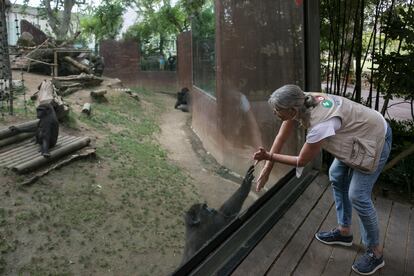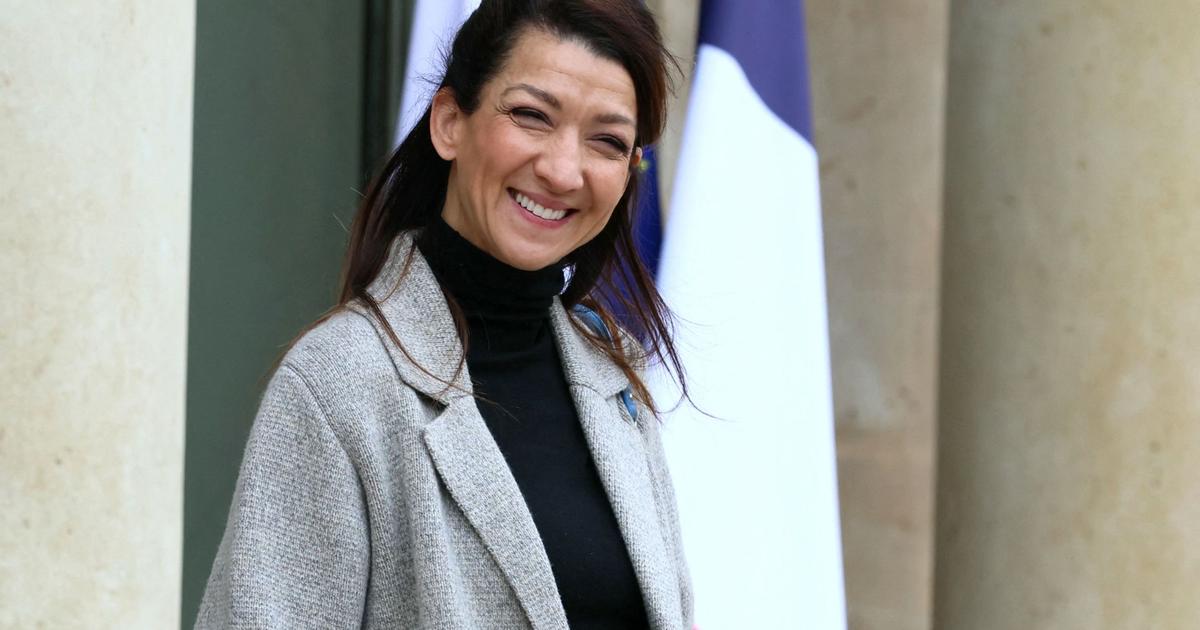Only his mother has taken him in her arms.
He was born on May 15, and since then, skin to skin.
He still has no name, among other things because his sex is unknown.
He is so small and is so close to his mother's breast that there is no way to tell from a distance.
“Look at
Jawi
,
she doesn't let go for a moment, she's a motherfucker, oh, how well she hooks the nipple!” María Teresa Abelló, curator of primates at the Barcelona Zoo, drools.
She is proud because in her 35 years at the municipal zoo (26 in her current position) she has seen primates abandon young in a corner, not knowing what to do with them, or place them in their groin where they keep the pigeons that they torture or eat, with the risk of suffocation.
To
Locky
, the grandmother of the newborn, a 39-year-old woman who wanders heavily through the glass enclosure, came to anesthetize her twice to put
Jawi
on her tit, spreading honey on her nipples, which point to her armpits, so that the little girl would remember better the long way to them.
"Zoos have turned 180 degrees in recent decades, especially in the case of primates," says Miquel Llorente, president of the Spanish Primatological Association.
When Abelló started in Barcelona, the gorillas were hosed out of the bedrooms to be exhibited and the newborns were raised in separate enclosures (“
nurseries
”) where they were bottle-fed.
“Hand-rearing prevented primates from seeing how their elders did it and the same with copulation, when the time came they simply didn't know, instinct alone is not valid”, says the expert.
Now human intervention is the minimum essential and the young see how the matter works from an early age.
"From
Copito de Nieve
descendants were sought without any conservationist criteria", admits the primatologist.
Then the births were announced with large advertising campaigns.
This Saturday, the Barcelona Zoo presented the little orangutan in an aseptic press release in which more space is devoted to disseminating the precarious situation of the species in Borneo and the zoo's intention to participate in a program to reintegrate individuals into their natural habitat.
Sensitivity has also changed outside the zoo: captive breeding has detractors among the scientific community and the general public.
In this process, zoos have gone from competing by pairing primates for commercial reasons, selling them to create new attractions, to doing so with a cooperative system "that seeks healthy and sustainable populations that ensure the survival of the species," according to Abelló, who is vice-coordinator of gorillas in the European Endangered Species Program (EEP) Ex Situ.
"We are the matchmakers for these threatened species," she says, "an especially complex task with apes, which have very sophisticated behaviors."
For each species, a dozen experts (from the zoos and independent) coordinate the transfer of individuals to make it as less traumatic as possible and supervise the genetic diversity of the crosses, avoiding consanguinity.
They also look at things like character and age.
Abelló illustrates a possible problem: if a young male arrives at a zoo where there are only older females “who tend to be cantankerous”, they can swarm against him, emasculating his dominant instinct.
'Tieta' and concubine
Despite the precautions, the birth of the baby still without a name has shades of Shakespearean drama that no one would guess watching the orangutans eat pipes and play in their thousand-meter enclosure (an extension of the 70 in which they lived until a few years ago) .
The father,
Karl
(25 years old), arrived from Dublin in 2005. He was young and insecure and had a hard time adjusting.
He was coming for
Jawi
(also 25), but
Locki
, the old female, adopted him —”like an
auntie
”—, which did not prevent him from impregnating her.
"First-timers tend to hang out with more experienced females, simply because they don't know where to go," explains Abelló, who has seen males "riding" females, barely rubbing.
A curiosity: despite their display of virility, gorillas and orangutans have particularly small penises, since they do not need to compete in this regard.
Karl
learned: this is her fifth calf, three with
Jawi
and two with her mother-in-law.
Given his impetus, a female born in Sweden,
Storma
, was brought to him in 2019 .
There was no chemistry.
Karl
tried to overpower her, she ran away and
Jawi
came out of her to defend her.
To show who was boss, the male held
Jawi
for six hours and had to sedate him.
Karl
now lives separately from the females and their children.
"He is very rough," says Abelló.
Although he considers him "a good father", there may be an accident with the newborn and his relationship with
Locki
is "unsustainable": "At her age she just wants to be calm, poor thing".
Orangutan copulation is generally violent: ventroventral unions (missionary posture, not puppy, like gorillas) in which the male holds the female with all four limbs.
But, in his last encounters,
Karl
came to bite his mother-in-law/concubine.
He does not tolerate his
nine-year-old son
De he Balú either.
Despite doing somersaults so happily among the females, he begins to be competition for "the sun king".
Will have to find another site soon.
In the wild, when a young male orangutan develops sexually, his father, who lives alone but has a scattered harem of females, kicks him out of the group.
The expelled wanders alone until he establishes his own territory and family (gorillas gather in groups of bachelors who go around playing the hooligan before settling down).
Some orangutans, upon reaching sexual maturity, develop the mumps that identify them as dominant males, in which the bellows to which the females come resonate.
Others don't, and remain as peripheral males, settling for the females that roam the alpha's territory.
That, in the jungle.
In captivity, you have to call another zoo.
That's where the EEP matchmakers come in.
"You have to see the needs of about 75 zoos, 60 in Europe," explains the primatologist, "to form viable pairs or create groups of singles."
It is a "very complicated game: you cannot go overboard and end up with offspring that you have nowhere to put."
The gorillas of Abelló are now in reproductive stoppage (the females take human contraceptives) because there is no room for more.
But the break cannot be prolonged much, because otherwise the young people will not be able to observe the process nor will they know how to breed in the future.
María Teresa Abelló, curator of primates at the Barcelona Zoo, greets a specimen in the gorilla enclosure this Monday.
Massimiliano Minocri
Among orangutans alone, the EEP carries out some 20 “transfers” a year and its “associations” give around a dozen offspring a year;
So far in 2022, three have been born in Europe and another in a zoo in New Zealand.
They are expensive movements (the person who receives the animal pays for the transport) that can be traumatic for the apes.
"And, the more stress, the less things work," says Abelló.
To facilitate integration, their caregivers travel with them, and there is an initial period in which it is observed "who gets closer to the gate with".
The contacts start one by one, with whom it has been noticed "more
feeling
”.
"Sometimes they take longer to connect and other times they don't, like people," says Abelló.
"In general what works is that they are happy."
“That they are well”, is the phrase that the primatologist repeats the most throughout the morning at the zoo, in her office, full of photos of apes, she also has snapshots with Lee McGeorge Durrell, Jane Godall or Jordi Sabaté Pi .
Tinder for orangutans
Looking for that
feeling,
the Apenheul zoo in the Netherlands, where primates roam freely in a forest, launched the
Tinder project for orangutans four years ago together with the University of Leiden.
“It is proven that the preference for a mate favors the success of the same, it is like attraction in humans,” says Tom Roth, a primatologist specializing in animal behavior.
With small animals, such as birds, it is common to use a "
lover's lane
" , which consists of placing the males in cages so that the female chooses who to visit, he explains.
In the case of the great apes it would be very expensive and stressful for them, so Roth's team is looking for a way to "predict from a distance" possible
matches
.
Orangutans (only the ones who willingly want to play) are being trained to use touchscreens that show photos of suitors, double-chinned and not (so far they don't seem to much prefer dominants).
The next steps will be to analyze if they follow certain individuals with their eyes or include audio of their bellows.
"There's still a lot of work ahead of us," admits Roth.
A fix or a patch?
Tinder or no Tinder, zoos are aware of the criticism surrounding captive breeding.
Organizations such as the Great Ape Project defend that it continues to support "a business" and only increases the number of captive animals, considering that the separation of hominids from their families and friends "is cruel and unnecessary."
In Barcelona, the civil and scientific initiative ZOOXXI proposes a reconversion of the zoo in which new immersive technologies replace live animals.
Ex situ
reproduction
"It should only be for animals that participate in reintroduction projects in the context of ecosystem conservation programs," says spokesperson Rosi Carrillo, emphasizing "animal sentience": "Animals are individuals with cognitive abilities, emotional states and personality , our change in relationship with them comes from understanding that they are someone and not something”.
Although both the Barcelona and Apelheun zoos have reintroduction programs, these are incipient.
Zoos defend their educational and conservation role.
"Living animals convey an emotion for nature that is not comparable to any technology," says Abelló.
"And the way the world is, it is essential to create a genetic reservoir," he says, insisting that part of the function of zoos is to create DNA biobanks that could be used to rescue extinct species in a "still unimaginable" future.
Roth adds another variable: "The need for captive animals to experience a fundamental part of their natural behavior: to have young."
At an intermediate point, Miquel Llorente, with “friends on both sides”, points out the logic of both positions and their ethical edges: “To what extent do we have the right to subject a baby to live its entire life in captivity? On the other hand, who are you to decide that a gorilla is not a mother?
His hope is that the zoos go towards the reintroduction: “No matter how punctual they are, it is necessary to appreciate that they participate in this type of program, which is very slow and very expensive, because it makes no sense to create a reservoir if it is not to return a species to its habitat".
And he raises one last question: “To affirm that captivity is bad has no scientific evidence, there are animals that do worse and others better, coffee does not work for everyone, more individualized interpretations must be made...
And what is it to be free in any case?
Believing that mountain gorillas are free is a mistake.
They are managed.
We have reached such a point in the control of nature that in the Virunga National Park, a remote place, you pay a thousand euros to enter to see them: freedom is now simply a bigger cage”.
You can follow
MATERIA
on
,
and
, or sign up here to receive
our weekly newsletter
.















